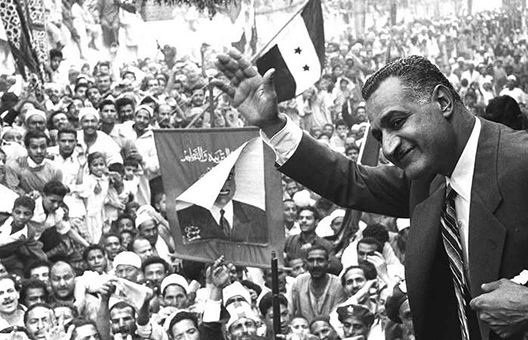 Nasser’s Republic: The Making of Modern Egypt begins with footage of Gamal Abdel Nasser visiting the Aswan High Dam for the first time. The cheering crowds seen in the footage are a common sight in the documentary about Abdel Nasser, a polarizing figure in Egypt’s history. As Galal Amin puts it, “Many people would attribute all Egyptian problems to Nasser. And many people would say if only someone like Nasser would come back.”
Nasser’s Republic: The Making of Modern Egypt begins with footage of Gamal Abdel Nasser visiting the Aswan High Dam for the first time. The cheering crowds seen in the footage are a common sight in the documentary about Abdel Nasser, a polarizing figure in Egypt’s history. As Galal Amin puts it, “Many people would attribute all Egyptian problems to Nasser. And many people would say if only someone like Nasser would come back.”
Written and directed by Michal Goldman, whose previous work includes a documentary about Egyptian singing legend, Umm Kalthoum, Nasser’s Republic follows Nasser’s path: from a child shuffled from one family home to another after his mother’s death, to his role as a member of the Free Officers in Egypt’s 1952 Revolution, ending with his death as a result of a heart attack in 1970. It offers chronological insight into the key events in his political career, including the nationalization of the Suez Canal, Egypt’s brief unification with Syria, and his crackdown on the Muslim Brotherhood. It also details his relationships with those closest to him.
The documentary is a combination of archival footage and photographs, and includes excerpts from Nasser’s speeches and interviews, one in which the audience can hear several shots ring out in an attempted assassination on his life. Egyptian actor Khaled Abol Naga narrates passages from Nasser’s own writings, adding a personal dimension to the story.
Commentary from historians, journalists, and poets among them Khaled Fahmy, Galal Amin, Hani Shukrallah, and Tewfik Aclimandos, feature prominently in the documentary. It also includes Insight from those close to Abdel Nasser himself including his daughter Hoda and his aide, Mohamed Fayek, and observations from US diplomats, including a Foreign Service officers who served in the US embassy in 1952. Interviews with Egyptians in the street, factory workers, and farmers are also a part of the one and a fifteen minute reflection on Nasser.
While the documentary focuses primarily on Nasser’s legacy, it also touches upon how that legacy has impacted today’s Egypt.
The documentary will be screened for the first time during Filmfest DC. More information on the screening can be found here.
Watch the trailer below:
